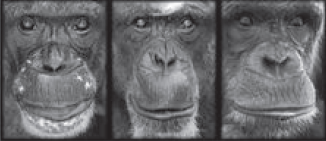Chimps use conceptual metaphors
Interview with
Why do we use phrases like, "Top-tier", or "Underclass" when we're considering  our peers? Some people think it's because we have language, and therefore, we use verbal metaphors as a convenient way to map priority social position. But then, what would happen if you asked a chimpanzee, which of course, can't talk?
our peers? Some people think it's because we have language, and therefore, we use verbal metaphors as a convenient way to map priority social position. But then, what would happen if you asked a chimpanzee, which of course, can't talk?
Ikuma - What we tried to find is the evolutional origin of the language, and especially when we use a word - high, low - those wordings can be everything, right? The price, is it high and low? In space, of course, it's high, low. So, why does this happen? We tackled this phenomenon in no human animals because this phenomenon is often argued in a context of a language evolution. Because we evolved this language system, we have this systematic mapping.
Chris - So, this would be like a sort of social pecking order, there's another metaphor, isn't it, where you've got people who are regarded as the "top of the tree" and the person who's at the "bottom of the tree", or premium price versus bargain basement? You're saying that we have those metaphors only because we have words for them?
Ikuma - That's what a lot of people actually believe, and what we raise the question here, is it really so? This might reflect small simple another mechanism to reduce the information processing. So in that case, other species should also have this kind of a connection. So that's what we try to reveal first.
Chris - So, your argument would be then that actually having that concept of high and low social pecking order, or whatever, comes first, there's some kind of neurological correlate for that and we humans just adopted some words to put that into words. Whereas other animals, simpler animals, that may not have language nonetheless would have that kind of construct still of a concept of things being higher or lower than others.
Ikuma - Right, exactly.
Chris - So, how on Earth can you probe that?
Ikuma - So, what I did is quite a simple approach, asking them if no human primate chimpanzee also have this kind of mapping or not. So, we tested six chimpanzees and what we did is show one picture first of the certain individual whom is familiar to the subject and then it's gone, and then two pictures come up to the screen, and then they have to choose who is the same individual. Arrangement of this choice is actually vertically organised, which means sometimes high-rank individual were located in the high place, but sometime low-rank individuals were located in the high place, and we don't ask actually rank of the individual but whenever they are looking for high rank or low rank individuals, which position fit to their representation. If it's much to their feeling, then that should be easier, but if it's not fitting, then it's going to be a little difficult than the fitting situation.
Chris - So, do you see a delay coming in then - when you put in the order the wrong way around, the lower ranking individual is higher up the screen? Do they take longer to choose that one as the one they saw previously, whereas if you get someone, an individual from their group who they recognise as being top of the tree and you put them at the top, they get it straight away?
Ikuma - Right, that's exactly the case.
Chris - Why do you think they do that? What's the reason for this?
Ikuma - What I think is it's more efficient for the living creature to understand information in the analogy of the space, for example. So, using some similar features to connect the multi-dimensional information, this is reduced of course for them to process. For example, when we think about a number line, just place number from one to nine in your space then most of the people do, small number go to the left, big number go to the right, and this is also the kind of analogy between the order and the space.
Chris - So, do you think this is then unique to animals that are social? Animals that need to be able to gauge where they are in the group in terms of their seniority, they're likelihood of being attacked, or their likelihood of being able to steal someone else's food. If I look at other animals like dogs, wolves that are pack animals, would I see a similar behaviour and similarly if I were to examine animals that usually, they've evolved to live on their own, I wouldn't see this behaviour?
Ikuma - Actually, this is a good point, and the reason why they have this kind of a connection between two different information, is probably from more basic requirement for them to reduce the cost for the processing. This could be more universal, not maybe only in a primate lineage but also other species as well, but which type of the information can be actually treated like this because for the social animals, social rank is very much important for them, right? So, that could be reason why they treat this rank in analogy to the space, but for other species who may not care about this rank, in that case, maybe not the case.
Chris - So, we're not as special after all.
- Previous Designing better wind farms
- Next Stem cells and smoking










Comments
Add a comment